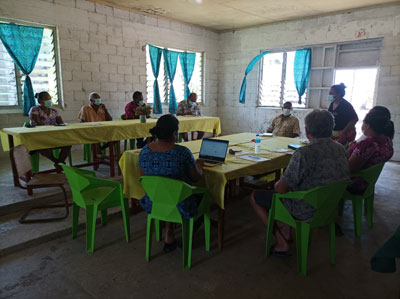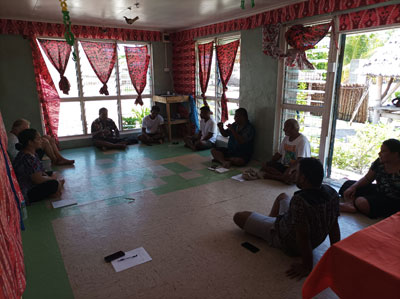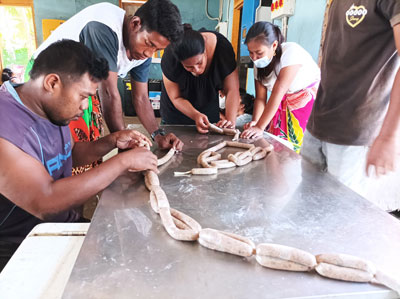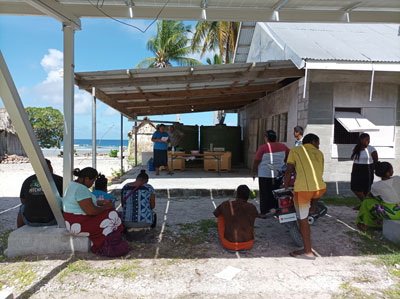SVC4SIDS field missions in Kiribati: Makin and Nikunau

Makin and Nikunau are part of Kiribati, a group of islands and atolls sited in the west-central Pacific Ocean. The two small islands have a population of around 2 000, with small-scale tuna fisheries playing an essential role for both local food security and livelihoods. Makin is located in the northmost point of Kiribati and has close proximity to the deep-water oceanic trench, with easy access to productive fishing grounds. Nikunau, on the other hand, sits in the south of the Gilbert islands, and has less favourable access to fishing areas. Although tuna is the main resource for both, differing geographies set out distinct scenarios for the tuna value chain in the islands.
The Sustainable Fish Value Chains for Small Island Developing States (SVC4SIDS) team went on mission to the Makin and Nikunau islands between June and July 2022 to assess the intervention of the project on-site, with technical staff from FAO and representatives from the Central Pacific Producers Ltd (CPPL) and the Ministry of Fisheries and Marine Resource Development (MFMRD).
|
Official meeting in Makin with senior stakeholders; the mayor, |
Official meeting in Nikunau with senior stakeholders; mayor, |
The objectives of the mission were to identify the island’s key actors, infrastructure and other factors related to the tuna value chain; identify the current operational and management status of the fish centre; conduct surveys to gather information, and hold an awareness session on hygiene, food safety and tuna processing with youth representatives.
The assessment of the missions reaffirmed that artisanal tuna fisheries are of significant importance to these islands, as a source of food, nutrients and income for their communities. The diversification of tuna processing, such as the development of shelf-stable products, has the potential to expand opportunities for income generation and reduce dependence on imports, while enabling output to be stored in anticipation of demand from the domestic market or sent to regional markets such as Tarawa.
|
Tuna (skipjack and yellowfin) sausage processing |
Hygiene and food safety awareness session |
The way forward
The mission had the opportunity to provide clear guidance for the potential development of processed products, and youth representatives in the islands were also able to engage in the practical application of good hygiene and food safety practices with hands-on experience of tuna processing. Moreover, the mission identified a number of challenges faced by fishermen. In Makin, where a more commercial fishery has evolved, limited availability of fishing gear, shortage of fuel and shortcomings in the policies of the fish centre were identified. The major challenges in Nikunau were bad weather conditions, limited fuel and engine failures. The information obtained during the missions will give insight for the implementation phase of the SVC4SIDS project.
Contact:
Additional resources
Video: The Sustainable Fish Value Chain for Small Island Developing States (SVC4SIDS)





